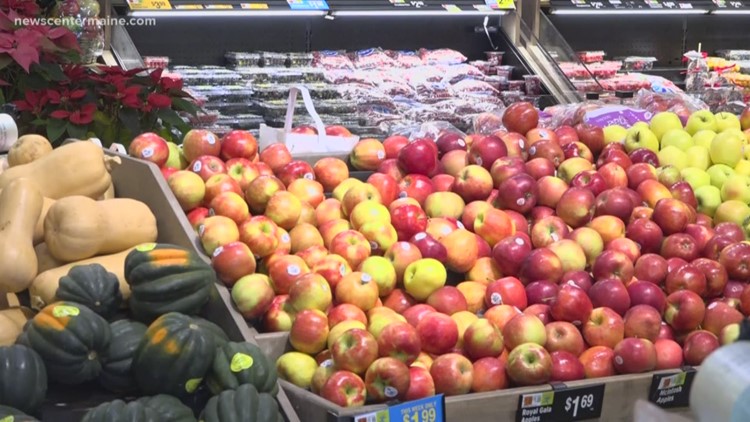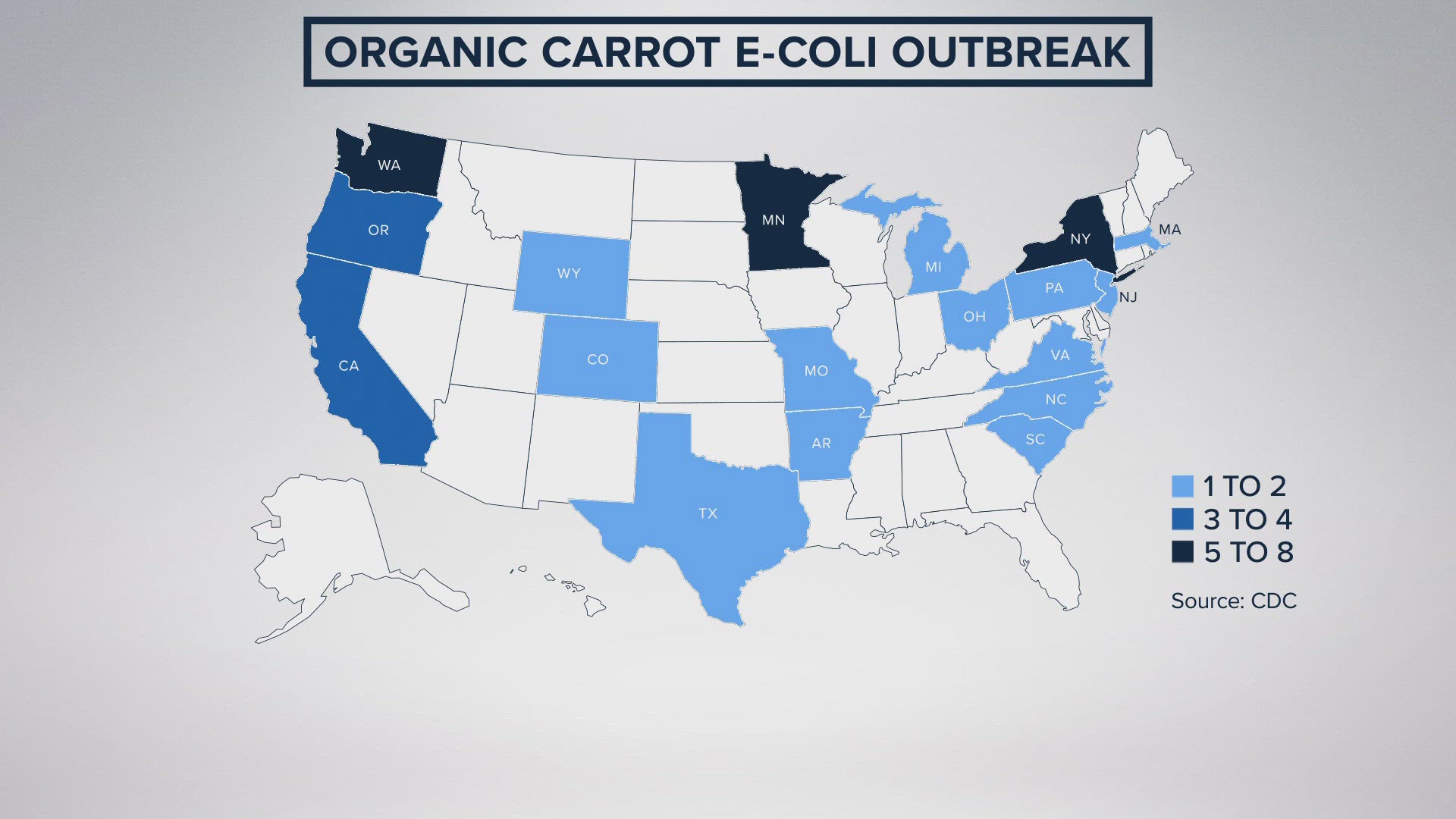SCARBOROUGH, Maine — Hannaford on Tuesday announced that each of its 183 stores donates or diverts all food at risk of going to waste, sending no food at all to landfills.
Hannaford said in a release that it achieved the milestone with a "multi-pronged approach focused on first preventing food waste through strategic product ordering and management at the store level."
According to Hannaford, employees are trained on how to responsibility handle food to avoid damage and exposure to temperature variation.
Each Hannaford store also strictly follows the U.S. Environmental Protection Agency Food Recovery Hierarchy, which prioritizes the rescue of surplus product for donation to food insecure individuals, according to Hannaford. Other key elements of Hannaford’s food waste diversion program include donations to local farmers for animal feed and food-to-energy conversion efforts, Hannaford said.
Hannaford’s adherence to this process kept 65 million pounds of food waste from reaching landfills in 2020, according to the company.
“The health and well-being of our planet are a top priority for all of us at Hannaford and we recognize that our role in the food supply chain comes with great responsibility,” Mike Vail, president of Hannaford, said. “The impact food waste has on our environment cannot be overstated. When we first established this goal, it was with the greater purpose of making a real and positive impact on our communities. Eliminating hunger and food waste are essential to improving the world we live in.”
Hannaford said it fully realized the achievement of zero food waste by partnering with Agri-Cycle, a food waste recycling company based in Scarborough, to turn food unsuitable for human and animal consumption into energy.
Hannaford said Agri-Cycle’s operation includes a state-of-the-art de-packaging machine that separates expired or damaged packaged food from its container—allowing for easy recycling of food waste that would otherwise end up in a landfill due to its packaging.
Agri-Cycle regularly services Hannaford stores to pick up inedible food, which their anerobic digesters transform into electricity that is sold back onto the grid, according to Hannaford. The anerobic digestor is located at Agri-Cycle’s sister company - the five-generation family owned-and operated Stonyvale Farms in Exeter, Maine. In addition to energy, a byproduct of the process produces liquid fertilizer as well as bedding for the farm’s dairy cows, resulting in a virtuous cycle, according to Hannaford.
“Hannaford is a true sustainability champion with a deep understanding of the challenges regarding food waste recycling. Solutions are never one-process fits all,” Dan Bell, president and co-founder of Agri-Cycle, said. “By taking a multifaceted approach, Hannaford ensures they are navigating the food waste hierarchy with intent, maximizing the value of their unsold food by helping to create renewable energy while protecting the environment.”
“Hannaford’s role as a frontrunner in achieving this milestone has allowed Agri-Cycle to gain efficiency of scale and provide food waste recycling services to many other businesses in towns and cities across New England,” Bell added. “Hannaford has had a significant impact not only at their stores, but on hundreds of other food waste producers throughout the region.”
As a Feeding America partner, Hannaford said it donates as much safe and nutritious food as possible to a network of community pantries, soup kitchens and food banks. Hannaford said its stores donated more than 25 million pounds of food, such beef and chicken; fruit and vegetables; pasta and eggs, for local hunger relief organizations in 2020.
Among the thousands of hunger relief organizations benefitting from Hannaford’s food recovery efforts is Good Shepherd Food Bank of Maine, which receives regular deliveries from Hannaford.
“Hannaford has been the largest food donor to the Food Bank going back to our founding 40 years ago,” Erin Fogg, vice president of development and communications for Good Shepherd Food Bank, said. “Over the decades Hannaford has innovated and found new ways to support our food distribution with both shelf-stable and fresh, nutritious food and produce. Food from Hannaford stores is distributed through the Food Bank’s partner network of over 500 hunger-relief organizations, helping thousands of Mainers who are experiencing hunger.”
Additionally, Hannaford said its stores donate food not suitable for human consumption to local livestock farmers, who use the items as feed for cows, sheep, pigs and other animals.
Leaders and sustainability advocates and experts applauded Hannaford’s innovation, leadership and commitment to impactful sustainability efforts. Here’s what they are saying:
Maine Gov. Janet Mills:
“I congratulate Hannaford for this remarkable accomplishment and for their leadership. Their innovative approach to achieving zero food waste, in partnership with local companies, helps feed hungry Maine people, generates renewable energy, and protects our environment. It is blueprint for how Maine can reduce food waste in a sustainable, beneficial way.”
U.S. Sen. Angus King:
“Today’s announcement from Hannaford Supermarkets is a milestone accomplishment, which reflects the company’s vision, follow-through, and commitment to the public good. From feeding our hungry citizens through support for local food banks to supporting local farmers and generating new forms of energy, it is clear that this forward-thinking approach is yielding major benefits for people across Maine, with added benefits for the international effort to curb climate change. I commend Hannaford for their emphasis on long-term sustainability, and encourage other supermarkets nationwide to adopt this roadmap to reduce food waste.”
U.S. Sen. Susan Collins:
“With many families experiencing hunger due to the ongoing challenges caused by the pandemic, it is more important than ever to take steps to eliminate unnecessary food waste. I commend Hannaford’s innovative, holistic approach to eliminating food waste across all 183 of its stores by supporting local food pantries’ efforts to help food insecure Mainers, providing farmers with feed for their livestock, and partnering with Agri-Cycle to convert additional waste into energy.”
U.S. Rep. Chellie Pingree:
“Food waste is one of the most pressing challenges of our time. At the federal level, I have made food waste prevention a central tenet of my climate work. I plan to reintroduce several bills this Congress to help prevent food waste from ending up in landfills. As Hannaford has shown, there are so many opportunities to recover food. I applaud Hannaford for setting the goal within each of its 183 stores to donate or divert all food waste and sending no food at all to landfills.
U.S. Rep. Jared Golden:
“It’s great to see Maine companies like Hannaford leading the way on sustainability. Achieving zero food waste is a big deal for our natural environment, but it also presents opportunities to help provide for food insecure families in Maine and to grow renewable energy in our state. I applaud all the Hannaford workers who have worked hard to seize these opportunities, reduce food waste in their stores, and make this achievement possible.”
Maine Department of Agriculture, Conservation and Forestry Commissioner Amanda Beal:
“Hannaford’s efforts to take concrete steps toward reducing food waste by enhancing their ordering and handling systems, as well as ensuring efficient access to surplus food to Maine families who need it, is commendable. Furthermore, finding innovative ways to recapture energy and/or nutrients from food that is no longer edible demonstrates the kind of closed-loop actions we need to be undertaking to enhance sustainability in our food system.”
Natural Resources Council of Maine CEO Lisa Pohlmann:
“Eliminating food waste is a necessary step for all of us to take to strengthen our communities, combat the climate crisis, conserve natural resources, and create new jobs. It’s great to see businesses like Hannaford embracing Maine’s strong environmental ethic by taking steps to be a leader on sustainability and setting an example for others to follow.”
Beth Ahearn, director of government affairs for the Maine Conservation of Voters:
"It's time to follow Hannaford's lead and eliminate food waste across Maine—thanks for leading the way and demonstrating how you’re truly greater than groceries."



